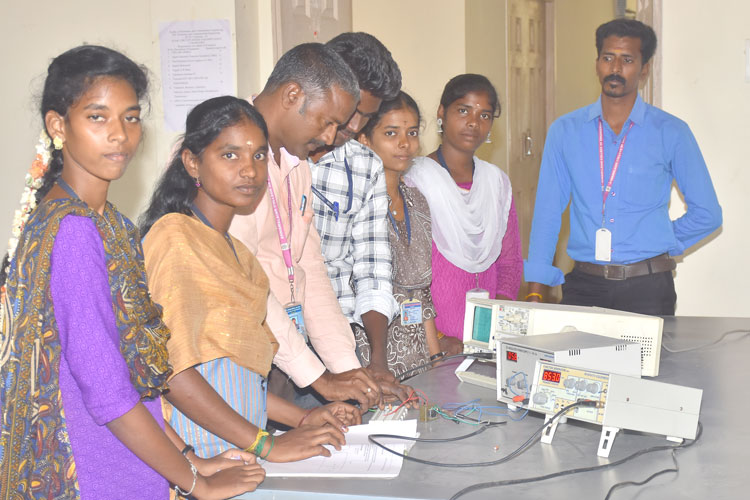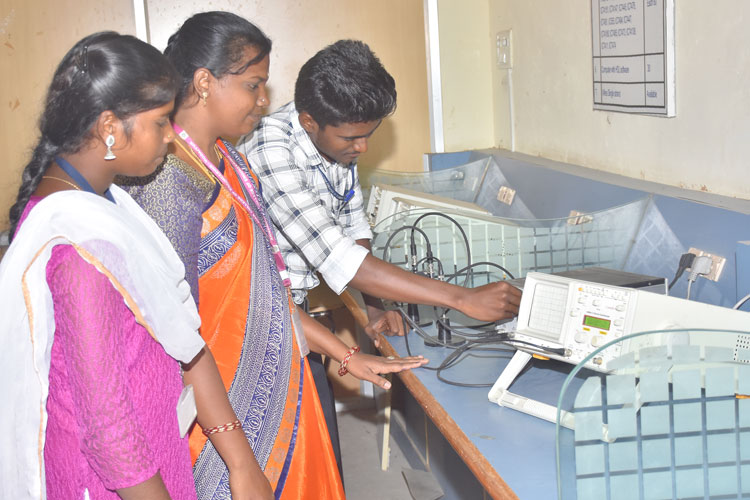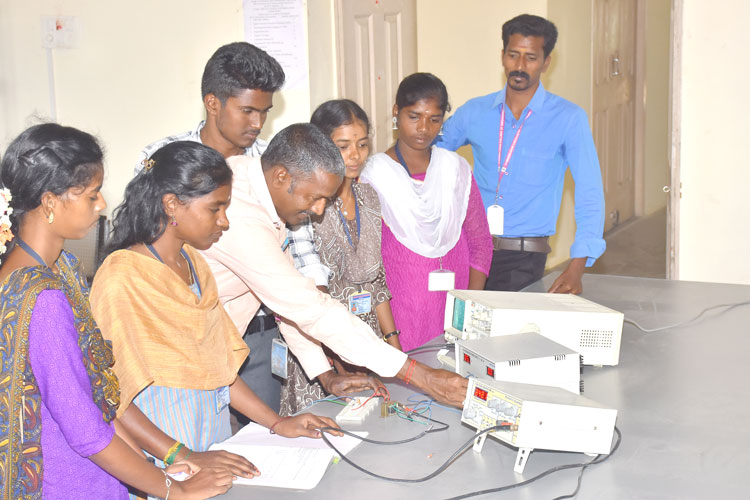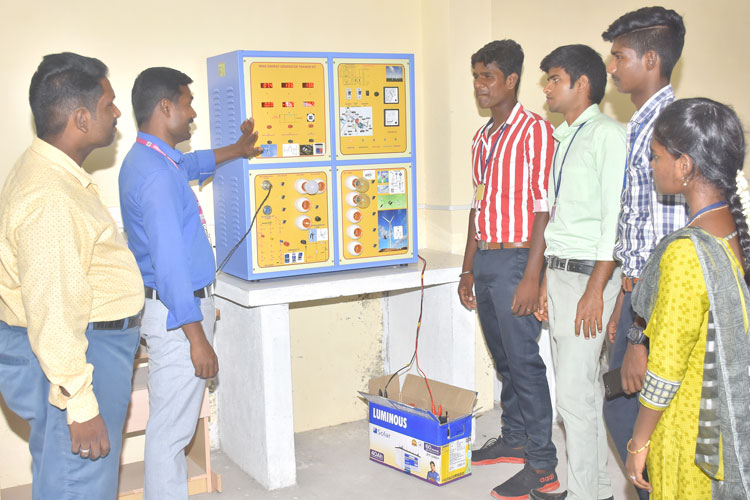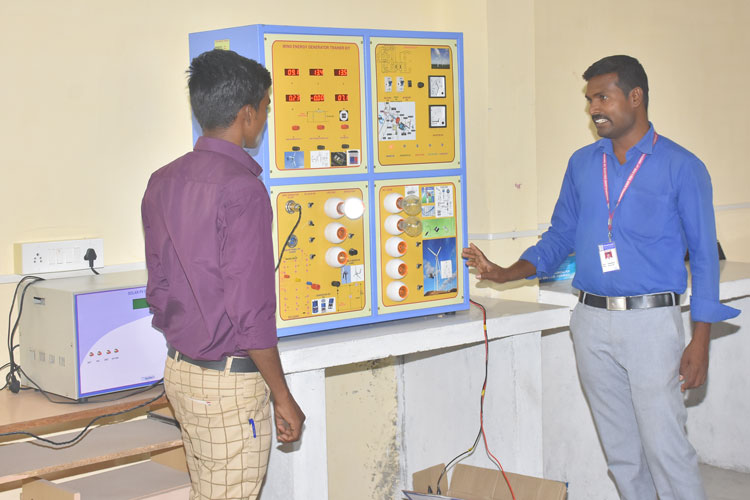About the Department
Annamalaiar College of Engineering affiliated to Anna University, Chennai, is established in the year of 2009. The college is recognized with the department named Electronics and Communication Engineering (ECE) which offers Under Graduate courses. The main focus of the ECE department is to impart the world class standard of technical education in the field of Electronics and Telecommunication for the benefit of the society.
The students of UG are well qualified to meet the demands of the Industry and Research Organization. Our department is equipped with eminent faculty members who are expertise in various technical domains. The total strength of regular teaching faculty members in the department is 12, of which 2 of them are doctorates and all the remaining staff members are qualified with Masters Degree. The research activities are carried out by a group of expert research members. The overall focus of the department is to
- Emphasis elemental knowledge of the subjects.
- Provide exposure to the emerging technology.
- Inculcate a strong research and development activities
Vision
To emerge as a centre of excellence in providing quality education and produce technically competent Electronics and Communication Engineers to meet the needs of the industry and society.
Mission
- To Provide the best facilities, infrastructure and environment to our students, researchers and faculty members to meet the challenges in the field of Electronics and Communication Engineering.
- To provide quality education through effective teaching learning process for their future career, viz placement and higher education.
- To provide insight in to the core domains with industry interaction.
- To prepare graduates adaptable to the changing requirements of the society through lifelong learning.
HOD Profile
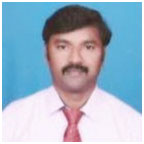
Prof. K. Cholan, M.E, (Ph.D)
Professor and Head of the Department of Electronics and Communication Engineering
K.Cholan Professor and Head of the Department of Electronics and Communication Engineering has 16 years of teaching experience. Her research interests are Medical Electronics, Signal processing, Wireless communication, VLSI Design. He has graduated from St. Peters Engineering College, Madras University, in Electronics and Instrumentation Engineering [2004]. He has obtained her master degree in VLSI Design from Sathyabama University [2009] and He is Purchuing Ph.D degree from SPIHER, Chennai. He started her educational career as an lecturer.
Programme Outcomes (PO)
- Engineering knowledge:
Able to apply the knowledge of Mathematics, Science, Engineering fundamentals and an Engineering specialization to the solution of complex Engineering problems. - Problem Analysis:
Able to identify, formulate, review research literature, and analyze complex Engineering problems reaching substantiated conclusions using first principles of Mathematics, Natural sciences, and Engineering sciences. - Design/development of solutions:
Able to design solution for complex Engineering problems and design system components or processes that meet the specified needs with appropriate considerations for the public health and safety and the cultural, societal, and environmental considerations. - Conduct investigations of complex problems:
Able to use Research – based knowledge and research methods including design of experiments, analysis and interpretation of data, and synthesis of the information to provide valid conclusions. - Modern tool usage:
Able to create, select and apply appropriate techniques, resources, and modern Engineering IT tools including prediction and modeling to complex Engineering activities with an understanding of the limitations. - The engineer and society
Able to apply reasoning informed by the contextual knowledge to access societal, health, safety, legal and cultural issues and the consequent responsibilities relevant to the professional Engineering practice. - Environment and sustainability
Able to understand the impact of the professional Engineering solutions in societal and environmental context, and demonstrate the knowledge of, and need for sustainable development. - Ethics
Able to apply ethical principles and commit to professional ethics and responsibilities and norms of the Engineering practice. - Individual and Team work
Able to function effectively as an individual, and as a member or leader in diverse teams, and in multidisciplinary settings. - Communication
Able to communicate effectively on complex Engineering activities with the Engineering community and with society at large, such as, being able to comprehend and write effective reports and design documentation, make effective presentations, and give and receive clear instructions. - Project Management and Finance
Able to demonstrate knowledge and understanding of the engineering and management principles and apply these to ones own work, as a member and leader in a team, to manage projects and in multidisciplinary environments. - Life long learning
Able to recognize the needs for, and have the preparation and ability to engage in independent and life-long learning in the broadest contest of technological change.
Programme Educational Objectives(PEO)
- To prepare students to analyze, design and implement electronic circuits and systems using the knowledge acquired from basic science and mathematics.
- To train students with good scientific and engineering knowledge so as to comprehend, analyze, design and create novel products and solutions for real life problems.
- To introduce the research world to the graduates not only in their own domain but also in multidisciplinary domain, so that they feel motivated for higher studies.
- To prepare graduates to exhibit professionalism, ethical attitude, communication skills, team work and leadership qualities in their profession and adapt to current trends by engaging in lifelong learning.
- To practice professionalism in a collaborative, team oriented manner that embraces the multicultural environment of today’s business world.
Programme Specific Outcomes (PSO)
- Graduates should demonstrate an understanding of the basic concepts in the primary area of Electronics and Communication Engineering including analysis of circuits containing both active and passive components, electronic systems, control systems, electromagnetic systems, digital systems, computer applications and communications.
- Graduates should demonstrate the ability to utilize the mathematics and the fundamental knowledge of Electronics and Communication Engineering to design complex systems which may contain both software and hardware components to meet the desired needs.
- The graduates are capable of excelling in Electronics and Communication Engineering industry/Academic/Software companies through professional careers
Electronics and Communication Engineering department has a total of 1000 square meter land area for laboratories. Research and Development (R&D) center in the institution provides a platform to the students of ECE to apply the learnt concepts in class to extend to do research in addition to laboratory experiments listed in the academic curriculum. There are separate labs for each of the Semester that includes
- Circuits and Devices Laboratory
- Analog and Digital Circuits Laboratory
- Circuits Design and Simulation Laboratory
- Linear Integrated Circuits Laboratory
- Digital Signal Processing Laboratory
- Communication Systems Laboratory
- Microprocessors and Microcontrollers Laboratory
- VLSI Design Laboratory
- Embedded Laboratory
- Advanced Communication Laboratory
- Project Work
